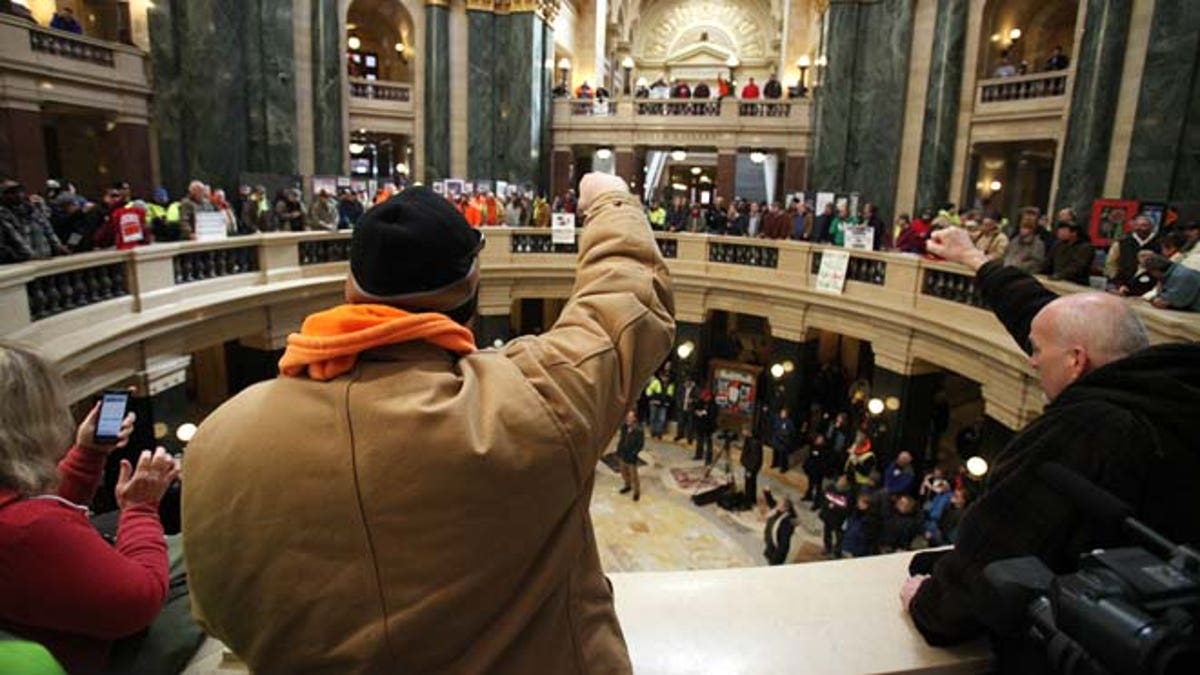
March 5, 2015: A crowd rallies inside the Wisconsin State Capitol as the state Assembly debates the right-to-work bill in Madison, Wis. (AP)
Wisconsin lawmakers voted Friday to make their state the 25th to enact right-to-work legislation, pushing a fast-tracked bill through the Assembly after an overnight debate and sending it on to Gov. Scott Walker for his promised signature.
The Republican governor, a likely 2016 presidential candidate who rose to national prominence by taking on public-sector unions four years ago, plans to sign it Monday. Walker planned to be in Iowa for an agriculture summit on Saturday that's attracting other likely Republican presidential candidates.
The Assembly passed the bill 62-35 after a marathon session that included about 20 hours of debate. It was a straight party-line vote, with no Democrats backing the measure.
"Today is the day we have solidified the regressive era in Wisconsin," Democratic Rep. Terese Berceau, of Madison, said minutes before the vote.
The vote came after Walker said in September, during his re-election campaign, that right-to-work was not a priority and wouldn't come up this session. Walker called it a distraction and feared that protests would grow as large as those in 2011 when he effectively ended collective bargaining for most public workers. Legislative leaders, including Republican Assembly Speaker Robin Vos, also said right-to-work would not be debated.
But two weeks ago, when Senate Republicans said they were going forward with it, Walker said he would sign it and the Assembly fell in line.
The protests were not nearly as large as four years ago, growing only as large as about 3,000 people compared with 100,000 in 2011.
Democrats accused Republicans of pressing the issue to help Walker's likely presidential campaign.
"It's the workers in this state that are suffering through the politics of our governor's ambitions," said Democratic Rep. Cory Mason, of Racine.
Vos accused Democrats of having "Walker derangement syndrome," and said the bill was about giving workers the freedom to choose whether to pay union dues.
"I'm not going to apologize about using the word freedom," said Republican Rep. Jeremy Thiesfeldt, of Fond du Lac. "I'm going to use it over and over again because that's what this is about."
Rep. LaTonya Johnson, D-Milwaukee, and a member of AFSCME, said she cares about people more than freedom.
"It just angers me to know that we come here and we pass bills that affect people's everyday lives and we don't have a clue as to how those everyday people live or how they survive," Johnson said. "This bill is a bunch of crap."
The proposal would make it a crime punishable by up to nine months in jail to require private-sector workers who aren't in a union to pay dues.
Supporters argued it would make Wisconsin more attractive to businesses looking to move in or expand. But opponents said the goal is to destroy unions, which tend to vote Democrat, and a right-to-work law would depress wage and create more dangerous workplaces, in turn hurting the economy.
Twenty-four other states have right-to-work laws. Michigan and Indiana were the two most recent states to enact it, both in 2012.
Minutes after debate began in the Wisconsin Assembly on Thursday, protesters in the chamber's gallery interrupted Vos, shouting "Right-to-work is wrong for Wisconsin!" Vos ordered the galleries cleared, leading to lawmakers debating in a chamber with no spectators.




